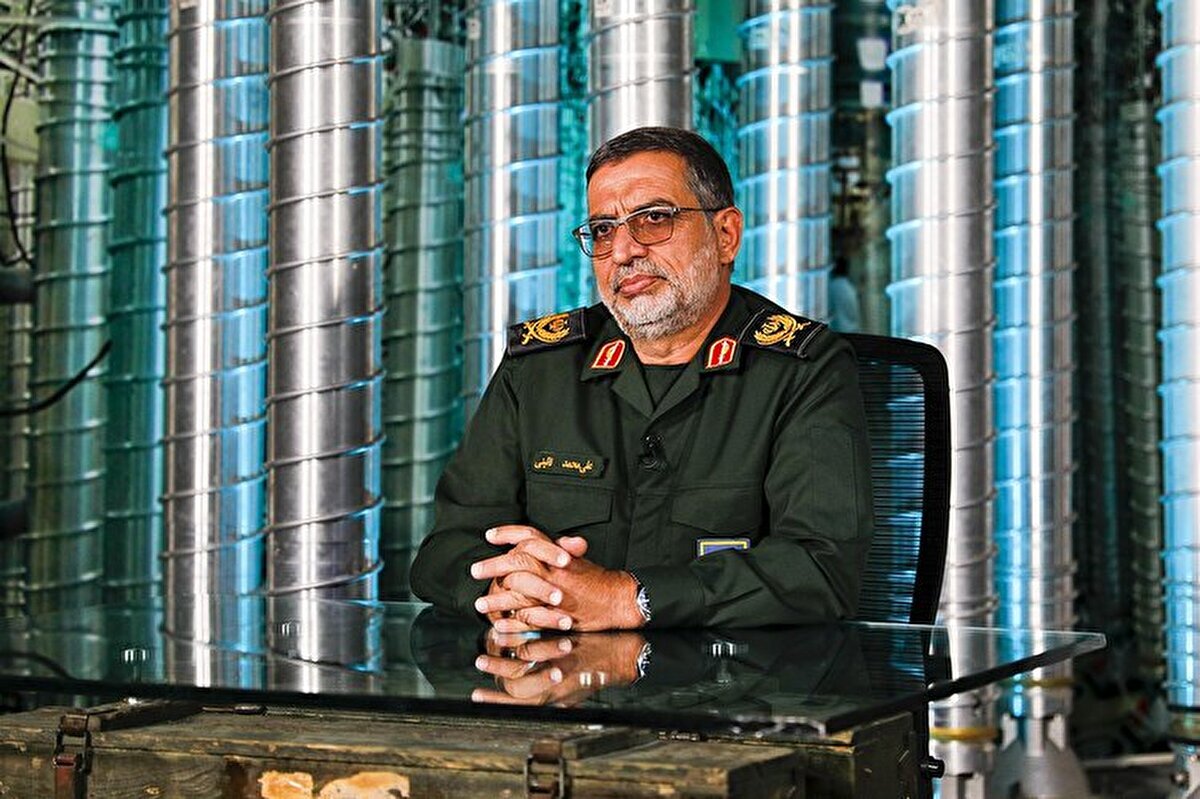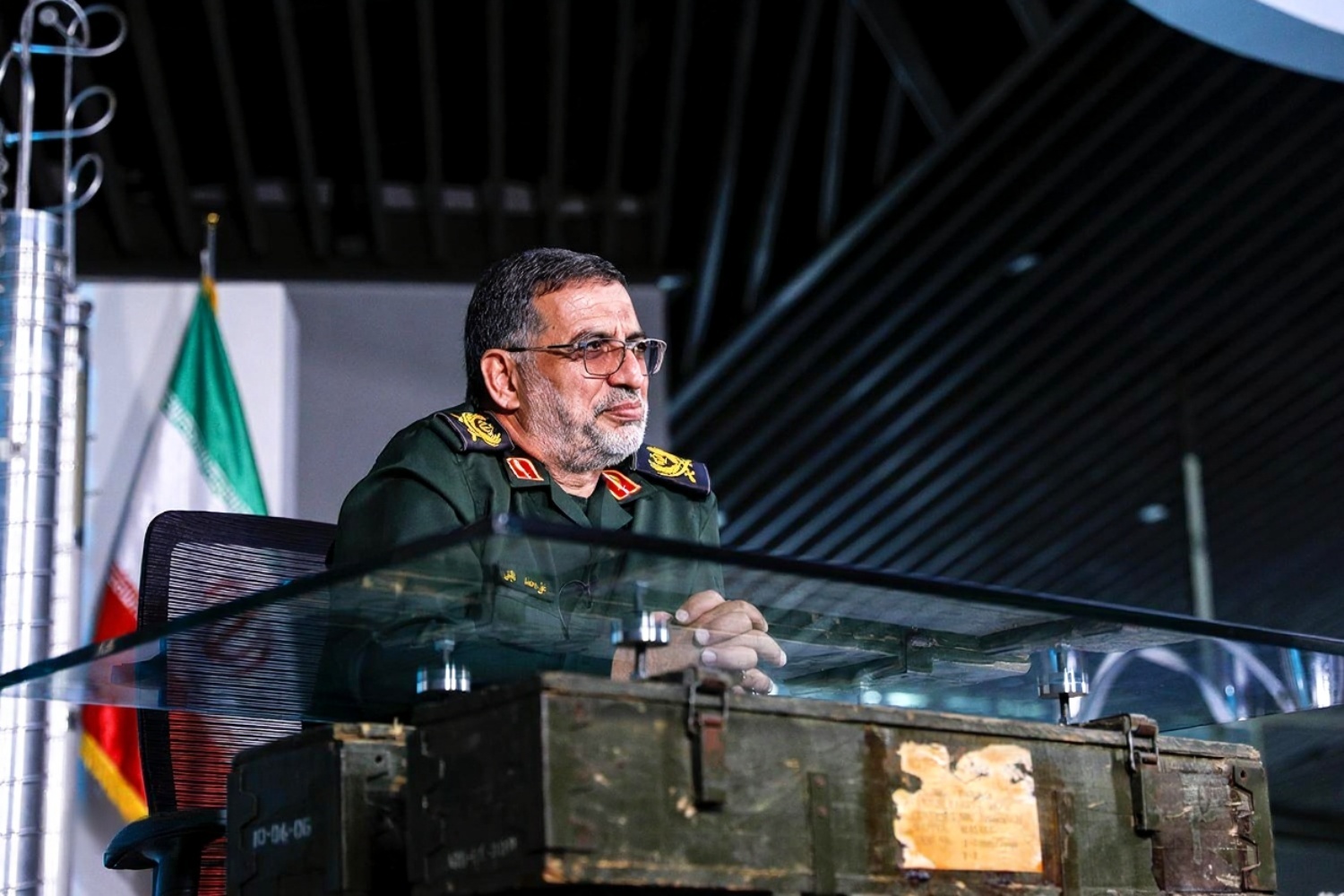Readiness of the Armed Forces in the 12-Day War Was Extraordinary
TEHRAN (Defapress) - Brigadier General Ali-Mohammad Naeini, Deputy of Public Relations and Spokesperson of the Islamic Revolutionary Guard Corps, while appearing on “Monavar” TV program, which is produced by Defapress to commemorate the 45th anniversary of the Sacred Defense and the twelve-day imposed war, stated: During the eight-year war, the global power structure was bipolar, and the Pahlavi regime of Iran and the Kingdom of Saudi Arabia were two pillars of power for preserving American interests in the region.

He added: “Tariq Aziz” (Foreign Minister and Deputy Prime Minister of the Ba’athist regime of Iraq), two months after the start of the imposed war, said in an interview that the Iran-Iraq war was decided after Saddam met with Brzezinski, and there Brzezinski promised that if you partition the whole of Khuzestan, you will be the gendarme of the region. So the United States was the main architect of the Iran-Iraq war, whose goals were overthrowing the Islamic Republic, partitioning Iran, and gaining control over the Arvand.
The IRGC Deputy of Public Relations continued: The primary aim of the enemies in the war was to contain and weaken Iran, and their maximal goal was the overthrow of the Islamic Republic. The military objective of the war was also the complete occupation of Khuzestan and, at a minimum, full enemy control over the Arvand from the coasts of Iraq to Bandar Deylam, a fact that is entirely evident in the documents.
Differences and similarities between the eight-year war and the 12-day war
He added: Both the war by the Ba'athist regime of Iraq and the war by the Zionist regime against our country were completely proxy, and the goal of both was the disintegration of the country and the overthrow. In the eight-year war, the enemy sought the secession of Khuzestan and ultimately the overthrow of the system. In the recent war, the enemy also sought to strike at the components of the system's authority. The enemy assessed that with a widespread aerial attack, it would witness an uprising inside the country, and this uprising, with the entry of opposition forces from various borders, would lead to secessionism and overthrow.
Brigadier General Naeeni added: Both wars had the same objectives, but their natures were different. The eight-year war was land-centric and human force-centric, where the enemy intended to impose its will on us by capturing territory; but in the recent war, it was a hybrid war, technology-centric, missile-based, and air-based. In both wars, the enemies, assuming that Iran was in a weak position, decided to go to war, but their calculations in this regard were mistaken.
The Spokesperson of the IRGC stated: With the deterrent power of the Islamic Republic of Iran, the response of the armed forces, and the formation of national cohesion, all the enemy's calculations changed, and the enemy's hypothesis of a weak Iran faded; a hypothesis that the enemy had built in its psychological and cognitive warfare.
He added: In the recent war, the capabilities that emerged and manifested from us were the product of the eight-year Sacred Defense; in reality, our ability in the 12-day war was based on the experiences and achievements of the eight-year war.
Brigadier General Naeeni noted: When the imposed war started, the forces of the revolution had no understanding of war, did not know weapons, and there was no knowledge of offense and defense, attack and counterattack, reconnaissance, map reading, military terminology, and tools.
The Deputy of Public Relations of the IRGC said: The most important lesson from the eight-year Sacred Defense period was that we should pursue power-building. The threat to the Islamic Republic from the enemy is constant and inevitable; therefore, the thing that can deter the enemy from a new war, or in case of aggression, we can make the enemy regret it, is only "power" and "power-building."
He stated: We learned from the Sacred Defense to constantly enhance our combat readiness. In the words of the Leader, we controlled the fingertips and checked our combat readiness; we also formulated a defense doctrine for the country and practiced it, and we approved pre-war confrontation plans. The General Staff of the Armed Forces, the Supreme National Security Council, the Khatam al-Anbiya (PBUH) Headquarters, the IRGC Quds Force, and the Basij Resistance Force were established after the eight-year war.
Brigadier General Naeeni added: On this path, we reformed the structures and defined the demarcating lines of duties, responsibilities, and missions of the Army and the IRGC in the air, sea, and land domains after the war. In various components of power, including missile, drone, and assault vessels, we structured and trained the necessary human force. These are various achievements of the eight-year Sacred Defense period.
The Spokesperson of the IRGC, pointing to the role of technology, facilities, equipment, and national cohesion for success in a hard battle, said: What deters the enemy from a new war is power and power-building, and this is very important.
He reminded that during the Sacred Defense period, we understood that missile power is important. At that time, we only had one missile site. The Ba'athist regime of Iraq launched 330 missiles at various cities of our country; this is besides the aerial and artillery attacks carried out during the War of the Cities, but in eight years, we launched only 88 missiles.
Brigadier General Naeeni added: Certainly, if we had today's capability back then and could launch 20 missiles per day, that war would not have lasted eight years. In the eight-year war, it took a year to recover our power, to find ourselves, and to build confidence on the battlefield; but in the recent war, a few hours after the widespread and intense aggression of the Zionist regime, we immediately had the widespread launch of drones, and a few hours later, Operation True Promise 3 began.

We thwarted the enemy in the 8-year and 12-day wars
He stated that we created good military structures and products and thwarted the enemy in achieving its goals during the eight-year Sacred Defense and the 12-day war, adding: In the 12-day war, the enemy thought that in a surprise attack on Iranian positions, it would take five to seven days for our country to recover its power; but we witnessed that the projectiles were prepared quickly and Operation "True Promise 3" was launched with the mass firing of missiles.
The Deputy of Public Relations of the IRGC, stating that specialized and trained forces are one of the components of our power, said: If we did not have operational power at other levels, we could not have responded to the enemy's attack. All our commanders also had plans and initiative, and until the end of the war, they were not thinking about ending the war.
Brigadier General Naeeni, referring to Operations "True Promise 1 and 2", stated: The two Operations True Promise 1 and 2 were carried out in response to the enemy's aggression, and both operations were met with success; Martyrs Salami and Hajizadeh played an effective and decisive role in these two operations and worked continuously to enhance our missile readiness.
Moral characteristics of Major General Martyr Salami
He also, referring to the characteristics of the martyred commanders of the 12-day war, especially Major General Martyr "Salami", stated: Martyr Salami was a military theorist who had a good command of military and strategic affairs; he was completely proficient in up-to-date world knowledge and had full command of the English language. Martyr Salami would study the core of the matter and prepare appropriate content for specialized meetings.
The Spokesperson of the IRGC said: Approximately two thousand speeches by Major General Salami on various topics have been prepared, and when he spoke about any subject, the audience imagined that Martyr Salami was a specialist in that field. He was a concerned individual in all dimensions, and in the areas of public aid, deprivation alleviation, and construction, very good measures were taken during the period of this noble martyr; also, Martyr Salami said that our missile power in Operations True Promise 1 and 2 had increased by about 40 percent, and this achievement would be revealed in a possible future war with the enemies.
Brigadier General Naeeni added: In Operation True Promise 2, the planning was very good, but we had concerns; both about the missiles passing through the various layers of the enemy's air defense and about the accuracy of the work, how successful we could be. About half an hour before the operation, when we entered the headquarters with Martyr Salami, I found him very worried, and that reaction that Martyr Salami showed in the headquarters and the excitement that came over him, after the waterfall-like movement of the missiles and the missiles hitting the occupied territories and the accuracy the missiles had in hitting the targets, stemmed from the pre-operation anxiety, so when Martyr Salami saw that achievement, he was thankful to God Almighty; and his saying "Masha'Allah" was completely an unconscious emotional state resulting from admiration of the work and divine victory.
The Deputy of Public Relations of the IRGC emphasized: Some criticized the release of the images of the command room, but the IRGC is like this, and this feeling of Martyr Salami is in fact the feeling of a "people's commander" who shows his emotions after the efforts of the Islamic warriors bore fruit.
He said: In the 12-day war, we saw that despite the enemy's plots, there was no shortage in our country, but rather there was political and economic stability and national cohesion, the stores were full of essential goods, and no one was fleeing the country; but on the other side, the Zionist regime orders evacuations, and this is the difference between the two sides of the war and the difference in the enemy's calculations regarding the two sides of the field.
Most of the world's people believe in Iran's victory in the 12-day war
Brigadier General Naeeni, emphasizing that the readiness of the armed forces in the 12-day war was extraordinary, stated: Immediately after the enemy's aggression, that is, from three to three-thirty when the enemy targeted our main commanders, nuclear scientists, and some of our centers, at four in the morning, our drones were set in motion. We could have carried out the missile operation immediately as well, but due to some considerations, it was delayed for a few hours, meaning our readiness was extraordinary.
Referring to the necessity of confronting the enemy's hybrid war, he added: Today's war is a war of narratives, and according to the statement of the Supreme Leader of the Islamic Revolution, if you do not narrate, the enemy will narrate on your behalf; based on polls, 60% of the world's people consider Iran the winner of the war, and polls inside the occupied territories also show that the residents of those territories do not believe in the victory of the Zionists.
The Spokesperson of the IRGC, pointing to the role of narration in introducing the achievements of the Sacred Defense, noted: The museum (The National Museum of the Islamic Revolution and Sacred Defense) has an effect in stabilizing, consolidating, and sustaining the narratives of the Sacred Defense, and through planning, the narrative of our country's victory should be expressed in universities and schools.
Brigadier General Naeeni, also providing details about the 12-day Sacred Defense, described this war as the arena of the bravery of Iranian warriors on the fronts of truth against falsehood, and referring to the presence of specialized IRGC warriors at the launchers and offensive, combat, and electronic warfare systems, said: One of the users of the missile launchers, even though he was under enemy attack, with a burnt body quickly went towards other launchers and carried out the launches towards the occupied territories, and these missiles hit the target with precision.
